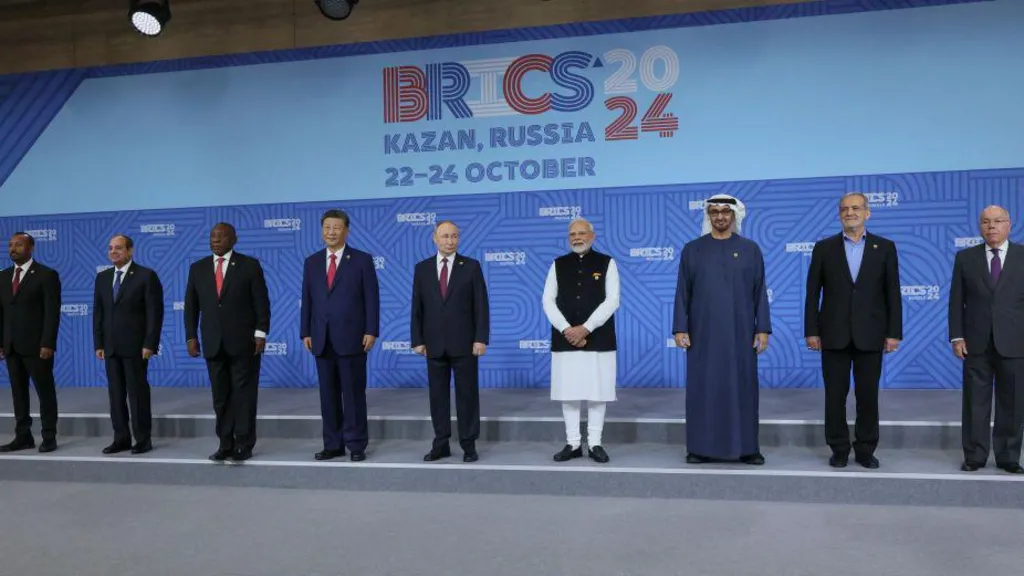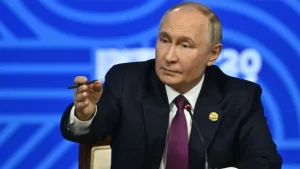India’s Diplomatic Balancing Act as BRICS Expands Its Influence
4 min read
Brics members, new and old, pose for a photo at the 2024 Summit

Brics members, new and old, pose for a photo at the 2024 Summit
For years, Western observers have largely dismissed BRICS as an inconsequential coalition. However, the recent annual summit held in Russia marked a significant turning point for the group, showcasing its growing influence on the global stage. Leaders from 36 countries, along with the UN Secretary-General, participated in the three-day event, during which BRICS formally welcomed four new members: Egypt, Ethiopia, Iran, and the United Arab Emirates. This expansion is noteworthy, as the group had previously added only one member—South Africa—in 2010 since its inception as BRIC in 2006.
The increasing prominence of BRICS is being fueled by rising discontent with Western policies and financial frameworks. As the coalition positions itself as an alternative to Western-led global governance, it is starting to gain traction in international discussions.
Interestingly, India, the most Western-oriented member of BRICS, stands to benefit significantly from the group’s evolution. India has established strong ties with the new members; for instance, Egypt is becoming an essential trade and security partner, while the UAE ranks among India’s top allies. India’s long-standing relationship with Ethiopia further strengthens its position within BRICS.
The original BRICS members continue to offer crucial advantages for India as well. Participation in BRICS allows New Delhi to affirm its commitment to Russia, despite ongoing Western efforts to isolate it. Moreover, collaborating with China within BRICS enables India to cautiously work on easing tensions with its neighbor. This is particularly significant following a border patrol agreement announced just before the summit, which likely facilitated a diplomatic meeting between Prime Minister Narendra Modi and Chinese President Xi Jinping on the summit’s sidelines.
BRICS also empowers India to advance its core foreign policy principle of strategic autonomy. This approach allows India to maintain balanced relationships across a diverse range of geopolitical players without formal alliances. New Delhi has cultivated essential partnerships, both bilaterally and multilaterally, that complement its engagement with BRICS. Consequently, its participation in this burgeoning coalition does not hinder its active role in the Indo-Pacific Quad or its strong ties with the U.S. and other Western powers.
Moreover, BRICS’ priorities closely align with India’s own objectives. The joint statement issued after the summit echoed principles such as engaging with the Global South—a critical focus for India—promoting multilateralism and multipolarity, advocating for UN reform (with India seeking a permanent seat on the UN Security Council), and opposing Western sanctions that affect trade with Russia and infrastructure projects in Iran.

However, the rise of BRICS also presents potential challenges for India. With the coalition gaining momentum and attracting new members, there is an increased risk that BRICS could adopt an overtly anti-Western stance. The inclusion of countries like Iran and the possibility of future members such as Belarus and Cuba may signal a shift in the coalition’s dynamics.
While India aims to maintain a careful balance between Western and non-Western alliances, it does not wish to be perceived as part of a group that openly opposes Western interests. Yet, concerns about BRICS being anti-West may be overstated. Aside from Iran, the new members maintain close ties with Western nations. Future candidates for BRICS membership include countries like Turkey and Vietnam, which are not inherently anti-Western.
Even with the addition of new members, BRICS is unlikely to present a cohesive front against the West. The group has historically struggled to achieve consensus among its members, a challenge that may become more pronounced with its recent expansion. Many of the new members have complex and strained relations with each other; for instance, Iran has tensions with both Egypt and the UAE, while Egypt and Ethiopia are embroiled in their own disputes.
Despite recent efforts to ease tensions, India’s relationship with China remains fraught due to ongoing border disputes and regional competition. Thus, BRICS offers India a strategic platform to collaborate with friendly nations while espousing principles aligned with its foreign policy goals. This balancing act allows India to engage meaningfully in a multipolar world without sacrificing its ties with the West.
In conclusion, while BRICS continues to evolve and expand, its internal challenges and the complexities of its new members will likely limit its ability to pose a substantial threat to Western interests. The summit’s joint statement indicates a commitment to non-controversial initiatives focused on issues like climate change and public health, fostering cooperation among members rather than confrontation with the West. This cooperative spirit within BRICS aligns well with India’s diplomatic aspirations, ensuring that its engagement in the coalition is both beneficial and balanced.